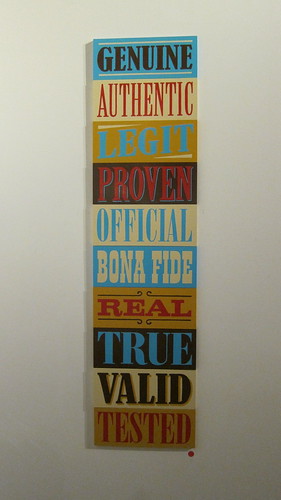This is quite a long post because I'm very excited about all this... Here's the super-short version: I decided to completely redesign my academic skills teaching. It went really well. Feedback was great. The students took part in Battledecks competitions, which was awesome. I learned certain things along the way. I think there's room for rethinking our approach to infolit.
Background
I do quite a lot of external talks and workshops, and much to my relief the feedback is generally better than I could hope for. What's more, I really enjoy them. I also do a fair amount of academic skills teaching as part of my job, and the feedback is just okay. And I don't particularly enjoy it a lot of the time - I enjoy the interaction with students, but I can't get worked up about the sessions, they feel a bit dull for all concerned.
Last academic year was my first as an Academic Liaison Librarian, and although I'd done information literacy sessions before I wasn't sufficiently confident to do more than take my predecessors' induction teaching materials, and try and make them my own. This time around though, I wanted to see if it was possible to do something different. I basically wanted to approach this presentation like I would an external one, and see if the students could get more out of it.
The biggest problem I have with teaching academic skills to undergrads is that the subject matter is boring. It really is dull. And a lot of it probably not that useful either; maybe to one or two students, but not most of them. I wrote a whole book without once using advanced search techniques for example (some would say it shows :) ) so why would a 1st year realistically want to know about them? For infolit teaching my process used to go like this: look at all the stuff I have to tell them about the library, and then work through it as unboringly as possible. For external workshops my process goes like this: think what is most useful and interesting to the audience, then try and present it in an engaging way so it stays with them.
These are definitely distinct approaches. Thinking about what is most useful to the audience may well involve not actually talking about 'library' stuff nearly as much. But if the students get more out of it, is that really a problem?
The plan
- Tell them about all sorts of things - some of them directly Library related, and some of them more generally information related
- Brand it like I would an external presentation - so rather than 'Library session' or whatever, I titled it '6 really useful things to make your academic life easier' (classic marketing tactics - sell the benefits of the session not the features, and stick a number on the front so it feels focussed)
- I created the slides like I would for an external presentation - ie I tried quite hard to make it nice, and didn't use any kind of template
- No workbook - instructions on the slides, and embed the slides where they can find them later for all the links etc
- Introduce Battledecks to end the session. Battledecks is something that happens in US Library conferences, where participants battle against each other, presenting on slides they've never seen before, which move on automatically after a certain amount of time (usually 15 or 20 seconds per slide). I've also seen it done here as part of Betta Kultcha sessions. Earlier in the year I tried it with some slightly drunk librarians at an SLA event as a way of summarising the session - what better way to reinforce the key points then to get someone else to do it? Better than me droning on about the same stuff all over again. Plus it's always quite hilarious, seeing people improvise over slides which are often just tenuous visual metaphors for the subject matter...
- (In this instance, our local cinema City Screen had given us some free student memberships to use as prizes in the Battledecks. I'm now thinking about local business I could contact about providing prizes for my other departments in the future. I offered each winner 4 student memberships - worth £100 in total, it has free tickets, money off at the bar etc - so they could give some to their friends. Having a desirable prize definitely helped ensure we had volunteers! We used an applauseometer to decide the winners in the session, and the last thing I wanted was for anyone to feel bad having been brave enough to volunteer so I declared each session a draw and gave both participants the full first prize...)
.
The stroke of luck
I was only planning to do this with the Department of Film, Theatre and Television because I was banking on there being enough performers in each class for there to be Battledecks volunteers. TFTV are a fantastic department and very supportive of what I try and do with them, and the head of department Andrew Higson has been extremely helpful in trying to further embed info lit. This year I did my usual 15 minutes as part of the general induction talk, to tell them about the Library and the services we offer (using the interactive map prezi with lots of our new videos embedded in it) and got the actual PC lab session moved back to Week 4, when the students aren't drowning in new information, and have been set assignments so realise they'll actually have use for the Library.
The stroke of luck came when Andrew invited me to do another 15 minutes in one of his lectures, the day before my PC lab sessions. It meant I could get all the not-overly-exciting-but-absolutely-neccessary stuff about finding resources off reading lists out the way then, and focus on more non-library stuff the next day.
The session
The session (the same thing repeated three times to get all the first years in) went really well - it felt quite good at the time but the feedback suggested it was very good. Here's the slides I used (which, incidentally just got featured on the Slideshare homepage - spreading the word for infolit!):
Battledecks was AWESOME! What I really like about it, just like at the SLA event, was that although it was hilarious and there were times when the presenter literally had no idea what the slide meant (until a member of the audience shouted out 'Duck Duck Go!' or whatever...), it was actually a really, really good summary of the session. It showed they'd really listened, they picked up on the key points and they fed them back to their peers. So much more effective than me summarising. And because it's the last thing we did and by far the best part of the session, it meant everyone left feeling happy (and gave good feedback!).
The feedback
The best part of this was the feedback. I compared it to an equivalent set of sessions from the previous year and in terms of rating it from 1 (outstanding) to 5 (terrible - there were no 4s and 5s in either year hence they don't appear below) there was a huge improvement:

This was great (not Judge Business School great but better than I am used to!) but I know from filling in those sorts of forms myself how easy it is to just tick numbers, so I was more interested in the comments.
Some of them referred to how the session had cleared up specific problems they'd been having, which was great. One referred to the 'excellent academic insight'. One person said 'I used to hate PowerPoint; you made me love it' (!), lots said it was either great or perfect, and one person ticked the box to say there was 'too much' covered in the session but then left comments in capitals that said 'BEST PRESENTATIONS EVER! PERFECT. THANKS FOR EVERYTHING'... There were lots of smiley faces, a few nice comments about me, and a third of them took the time to answer the 'what could be improved about the session?' question to specifically say that it couldn't be better (one person wrote: Not physically possible!). It was overwhelmingly better than my (distinctly underwhelming) feedback last year.
What was also interesting was that in answer to a question about what they found most useful, by far the majority replied that the stuff on SubjectGuides and JSTOR etc was the most useful (and none of them picked it as the least useful) - so smuggling in the Library stuff amid some more glamorous stuff elsewhere obviously didn't diminish its impact, in fact I'd argue it probably increased it.
Conclusions and changes
As you can tell I'm really chuffed about this. I enjoyed the fact that the students actually got more out of the session. I enjoyed the chance to talk about what I was interested in. I enjoyed actually applying the stuff I do / learn externally to my day-job (something my previous employer when unable to imagine was possible, but my current employer are very supportive of). And just as an aside, a colleague of mine tried this whole idea with Archaeology students and they really liked it too - proving that you don't need a great prize and a room full of budding actors to get battle decks volunteers...
When I do it again I'll be making some changes based on the feedback - in fact the slidedeck above is the 2nd version with some of this already taken into account. Someone suggested more funny clues for the battle-decks (hence Jay-Z is in there, rather than the JSTOR logo as used to be the case...) and someone else said they'd like to have seen some kind of information finding competition earlier in the session. I'd love to make it more interactive prior to the big battle decks finish, certainly. (The most common suggestion for improving the session was 'free chocolate', by the way...) I still don't think I'm very good at getting the balance right between talk, discussion and hands-on exercises so I'd like to improve how that works generally. But basically, it was fun! I'd genuinely recommend Battle decks to anyone - feel free to steal my slides if you'd like a starting point...
If you have suggestions on how to make sessions like these more interactive, or you've revamped your own infolit and the students have responded well, let me know in a comment!
- thewikiman






